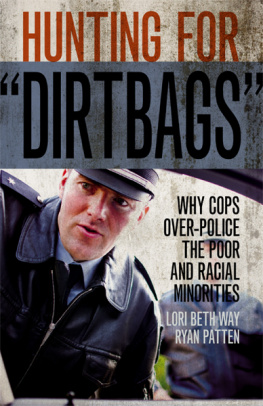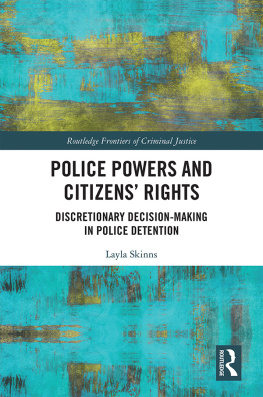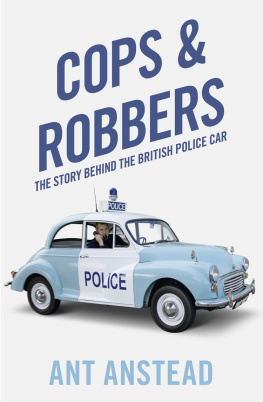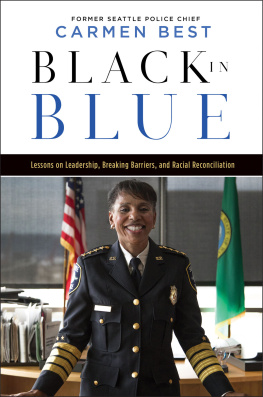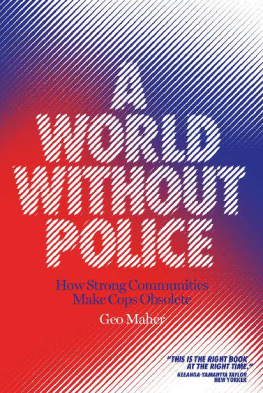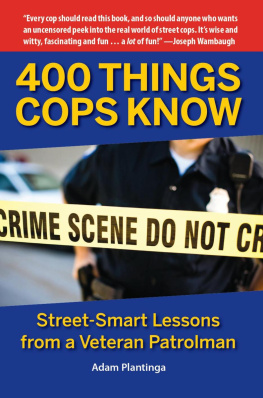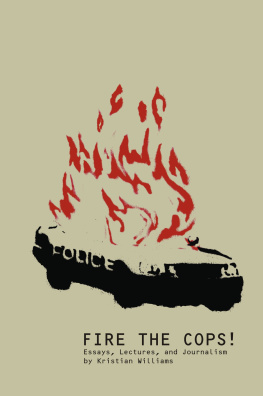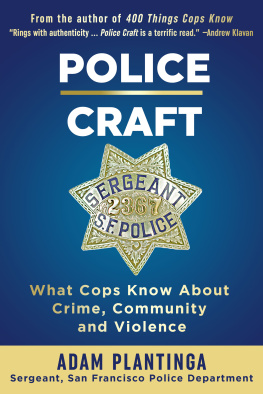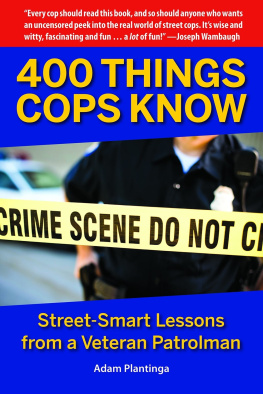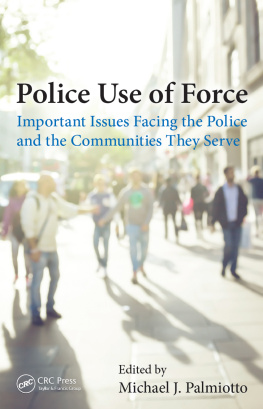Lori Beth Way - Hunting for Dirtbags: Why Cops Over-Police the Poor and Racial Minorities
Here you can read online Lori Beth Way - Hunting for Dirtbags: Why Cops Over-Police the Poor and Racial Minorities full text of the book (entire story) in english for free. Download pdf and epub, get meaning, cover and reviews about this ebook. year: 2013, publisher: Northeastern University Press, genre: Politics. Description of the work, (preface) as well as reviews are available. Best literature library LitArk.com created for fans of good reading and offers a wide selection of genres:
Romance novel
Science fiction
Adventure
Detective
Science
History
Home and family
Prose
Art
Politics
Computer
Non-fiction
Religion
Business
Children
Humor
Choose a favorite category and find really read worthwhile books. Enjoy immersion in the world of imagination, feel the emotions of the characters or learn something new for yourself, make an fascinating discovery.
- Book:Hunting for Dirtbags: Why Cops Over-Police the Poor and Racial Minorities
- Author:
- Publisher:Northeastern University Press
- Genre:
- Year:2013
- Rating:5 / 5
- Favourites:Add to favourites
- Your mark:
- 100
- 1
- 2
- 3
- 4
- 5
Hunting for Dirtbags: Why Cops Over-Police the Poor and Racial Minorities: summary, description and annotation
We offer to read an annotation, description, summary or preface (depends on what the author of the book "Hunting for Dirtbags: Why Cops Over-Police the Poor and Racial Minorities" wrote himself). If you haven't found the necessary information about the book — write in the comments, we will try to find it.
An inside look at police discretionary actions and their consequences for poor communities.
Lori Beth Way: author's other books
Who wrote Hunting for Dirtbags: Why Cops Over-Police the Poor and Racial Minorities? Find out the surname, the name of the author of the book and a list of all author's works by series.
Hunting for Dirtbags: Why Cops Over-Police the Poor and Racial Minorities — read online for free the complete book (whole text) full work
Below is the text of the book, divided by pages. System saving the place of the last page read, allows you to conveniently read the book "Hunting for Dirtbags: Why Cops Over-Police the Poor and Racial Minorities" online for free, without having to search again every time where you left off. Put a bookmark, and you can go to the page where you finished reading at any time.
Font size:
Interval:
Bookmark:
HUNTING FOR
DIRTBAGS
Why Cops Over-Police the
Poor and Racial Minorities
LORI BETH WAY AND RYAN PATTEN
NORTHEASTERN UNIVERSITY PRESS | BOSTON
This book is dedicated to those who made it possible: Clare Renzetti, Susan Miller, and the wonderful people at UPNE. Most of all, this book would have been impossible without the support and cooperation of the Stonesville and Seaside Police Departments. We value their effort and assistance and we hope to have portrayed them fairly.
Northeastern University Press
An imprint of University Press of New England
www.upne.com
2013 Northeastern University
All rights reserved
For permission to reproduce any of the material in this book, contact Permissions, University Press of New England, One Court Street, Suite 250, Lebanon NH 03766; or visit www.upne.com
Library of Congress Cataloging-in-Publication Data Way, Lori Beth.
Hunting for dirtbags : why cops over-police the poor and racial minorities / Lori Beth Way and Ryan Patten.
pages cm
Includes bibliographical references and index.
ISBN 978-1-55553-812-5 (cloth : alk. paper)
ISBN 978-1-55553-813-2 (pbk. : alk. paper)
ISBN 978-1-55553-814-9 (ebook)
1. Police discretion. 2. Police-community relations. 3. Poor. 4. Minorities. 5. Police United States Case studies. I. Patten, Ryan. II. Title.
HV7936.D54W39 2013
363.2'3080973 dc23 2012048404
ONE
The Undiagnosed Problem:
Discretionary Proactive Policing
TWO
Setting the Stage:
Stonesville and Seaside
THREE
Shaken or Stirred?
Choosing Your Policing Style
and Level of Proactivity
FOUR
Hunting Grounds:
And May the Odds Be Ever in Your Favor
FIVE
A Vicious Cycle:
Re-Policing the Poor and the
Effects of Probation and Parole Status
SIX
The Future:
Service-Oriented Policing
Notes
Discretionary Proactive Policing
You cant hunt in nice neighborhoods.
Stonesville officer
W hat role should the police serve in a democratic society? Should police departments work to reduce crime and catch lawbreakers, or should their focus primarily be on responding to citizen calls for service or assistance? Of course, these strategies are not mutually exclusive, but one relies on police officers to ferret out crime and the other requires residents to report problems including crimes. As an example, for about the last fifteen years the New York Police Department (NYPD) has adopted a very aggressive strategy to attack crime by catching would-be criminals before they commit crime (also known as order maintenance or zero tolerance policing). During those fifteen years, New York City, and the rest of the nation in general, has witnessed declining crime rates, and in New York City, the reduced crime rate has been attributed to the assertive policing techniques of the NYPD. The NYPDs crime-fighting strategies, however, have had negative impacts as well; these have been exclusively concentrated in the Black and Latino neighborhoods of New York City. The practice of proactive policing and the damaging consequences of this policing tactic for racial minorities and those living in poverty are not new and are still prevalent around the nation. We will discuss some of these negative impacts and New York City Mayor Michael Bloombergs cavalier response to them in detail later.
There is a long and well understood disconnect between how the police view their role and the day-to-day realities of their job. Whether desirable or not, police officers see themselves as crime fighters and want to be considered as such (Bittner 1990; Brown 1981; Klockars 1985; Manning 2001; Paoline 2004; Parnaby and Leyden 2011; Sparrow, Moore, and Kennedy 1990; Stanko 1989; Van Maanen 1974; Westley 1970). Research shows that approximately one-third of an officers time is spent on law enforcement activities (Famega 2005, 2009). In fact, 70 to 80 percent of calls for service to police departments are basic order maintenance or service calls rather than incidents involving any criminal behavior (National Research Council 2004). The image of the job of a crime fighter, however, is one that centers on officers investigating and following up on their suspicions through traffic stops and other contacts.
During a ten-hour shift, patrol officers respond to a variety of different requests for service from the citizenry via emergency (9-1-1) calls. Depending on the size and location of the police jurisdiction, during that shift dispatchers may not send an officer to any calls for service or, in a busy area, may send an officer to dozens of calls. Even for busy districts, though, officers will have time that is unassigned. While the amount of that time will vary, police officers unassigned time can reach three-quarters of their shift; how officers spend that time is completely discretionary (Famega, James, and Mazerolle 2005). What they choose to do with their free time, and the implications of those choices, are the stories of this book and some of the biggest concerns with policing in America.
Enforcing laws is one component of the larger criminal justice system. Police officers work within that system and respond to its institutional incentives and constraints. Since the 1980s, criminologists Additionally, increased incarceration of the poor and racial minorities actually creates long-term harm in these communities (Clear 2007; Pratt 2009). This book illustrates how the police fit into this larger political system. Specifically, through discretionary proactive policing (done in their free time), law enforcement officers monitor the lower classes to a greater degree than the middle and upper classes. Such police behavior feeds the cycle of depositing the poor into the criminal justice system and ensuring they remain under criminal justice scrutiny.
This research began with the following questions: What factors influence a police officers discretionary decisions? How and why do officers make the decisions they do on the street? To what degree do police officers differ in their decision making and what explains that variability? Alternatively, do patrol officers act in ways that are similar? If the criminal justice system has particular goals to control a certain segment of the population, how do the police react to that political context?
The central arguments of this book include the following: (1) there are institutional and organizational structures and incentives within both the police department and the criminal justice process that induce officers to patrol the poor, especially those from racial and ethnic minorities, to a greater degree; and (2) the institutional goal to produce citations and arrests leads officers to proactively patrol. Note that both of these arguments are addressing the effects of institutional incentives and organizational structures. We often want a simple story. Cops are good. Cops are bad. Cops are bigots or racists. Cops are not bigots or racists. The truth about policing and police officers, however, is extraordinarily complex. While individual personalities have been shown to affect police behavior to some degree (Miller 2003; Skolnick 1966), institutional choices made by police and city leaders and professional expectations of officers constrain some behaviors and incentivize others.
The term proactive policing has been used by police scholars to refer to a variety of activities, often positively associated with field interrogations, traffic stops, and/or enforcing laws related to driving under the influence, loitering, or possession and public consumption of drugs and alcohol. When we use the term proactive policing in this book, however, we are not referencing specific organized police mobilizations to certain neighborhoods derived from crime reports, such as hot spot or COMPSTAT policing. In hot spot and COMPSTAT policing, the police response is organized at the administrative level and carried out by the officers with specific goals of reducing a particular type of crime (Bowers et al. 2011; Braga, Hureau, and Papachristos 2012; Maple and Mitchell 1999; Ratcliffe et al. 2011; Sherman and Weisburd 1995; Telep and Weisburd 2012; Timoney 2010; Weisburd and Eck 2004; Weisburd et al. 2003; Willis, Mastrofski, and Weisburd 2007). Both hot spot and COMPSTAT can be considered proactive policing, because both strategies rely on reported crime and previous proactive resident contacts.
Font size:
Interval:
Bookmark:
Similar books «Hunting for Dirtbags: Why Cops Over-Police the Poor and Racial Minorities»
Look at similar books to Hunting for Dirtbags: Why Cops Over-Police the Poor and Racial Minorities. We have selected literature similar in name and meaning in the hope of providing readers with more options to find new, interesting, not yet read works.
Discussion, reviews of the book Hunting for Dirtbags: Why Cops Over-Police the Poor and Racial Minorities and just readers' own opinions. Leave your comments, write what you think about the work, its meaning or the main characters. Specify what exactly you liked and what you didn't like, and why you think so.

